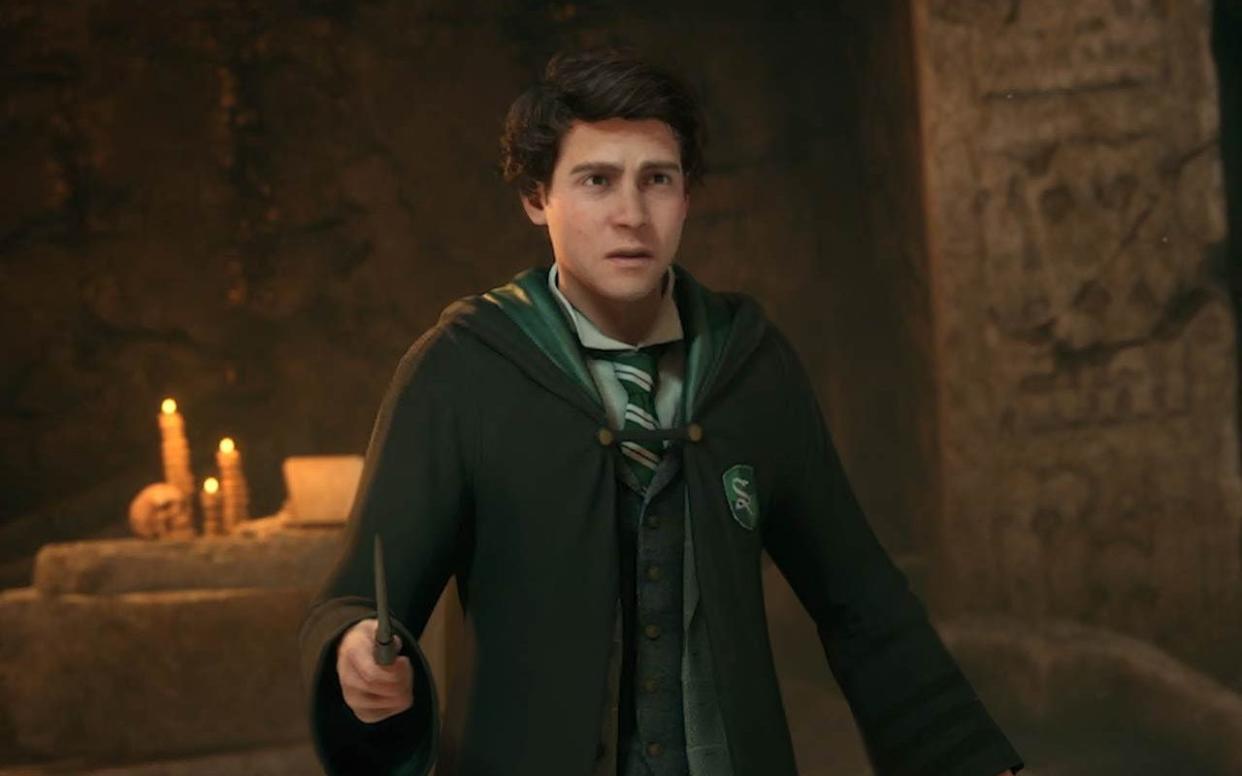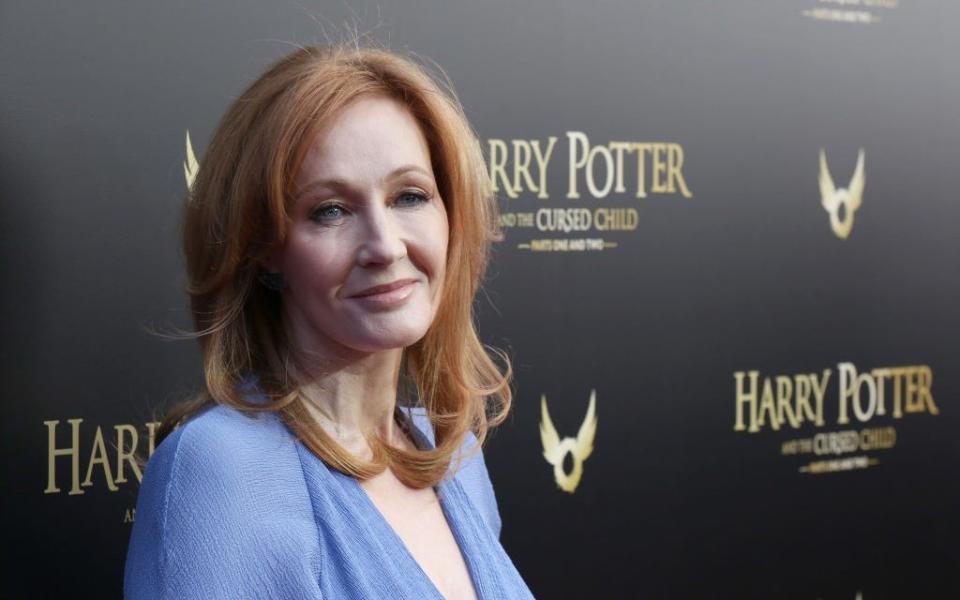How Hogwarts Legacy exposed the sheer toxicity of Harry Potter fandom

If you want a quiet life, publicly eviscerate a kitten or burn down an orphanage sooner than admit that you’re playing Hogwarts Legacy, the new Harry Potter-themed video game from Warner Bros. To express enthusiasm over this role-playing adventure, in which players become pupils at Hogwarts School of Witchcraft and Wizardry, is to invite a barrage of abuse on social media.
Earlier this week the game reviewers Shelby and Matt, founders of the popular YouTube channel Girlfriend Reviews, announced that they would be trying out Hogwarts Legacy live on the video streaming service Twitch. Several of their fans begged them not to play the game, and during the live session, Shelby was reduced to tears when a phalanx of trolls subscribed to their channel and hurled insults at them.
This debacle seems fairly typical of the dismal level any discourse is conducted at these days that concerns Harry Potter - or more specifically the boy wizard’s creator JK Rowling, whose stance on women’s rights has seen her widely denounced as Grand High Transphobe.
The fact that Girlfriend Reviews announced beforehand that they would be raising money for the Trevor Project (which provides counselling for LGBTQ+ teenagers) cut no ice with their detractors. And never mind the fact that Rowling had no involvement in the concept or writing of the game (although she will of course receive royalties).
Perhaps the most sinister aspect of this affair is that lists of Twitch streamers who have played the game are being posted online so they can be boycotted. There is even a website - havetheystreamedthatwizardgame.com - to enable transgressors to be identified.
It seems clear that whatever planet the Rowling haters occupy slipped the gravitational pull of rationality some time ago. But part of the reason that the anger towards Rowling is so intense is that those who now loathe her once loved her, for championing the values of inclusion and tolerance in the Potter books.
I asked the writer and Rowling apostate Aja Romano, who made the 2020 BBC Radio documentary Can I Still Read Harry Potter?, to account for the depth of feeling. “I’m not interested in playing Hogwarts Legacy, or reading her books … I know many people love the new game and that the creators who worked on it worked hard to distance themselves from Rowling’s transphobia. But the bottom line for me is that any profit the game makes will ultimately be lining Rowling’s pockets.
“Moreover, supporting the game helps keep the franchise itself alive and kicking when it should be in its death throes as a cultural influence. It’s over. Harry Potter’s cultural value lay in the way it spoke to a generation of kids who grew up progressive because of ideals they learned from the books. But that impact is almost totally ruined now. Most of the fans I know just want to cut their losses and move on.”

For the feminist writer and critic Joan Smith, however, the explanation for the strength of feeling against Rowling must lie elsewhere - as she is not actually transphobic. “It’s not a matter of separating the art from the artist, and whether or not her unpleasant views are reflected in her books, or the game based on them. The views complained about don’t exist.
“Nobody who accuses JK Rowling of being transphobic has ever been able to come up with anything she’s said or written which is actually hostile to trans people or saying that they shouldn’t have the same rights as everybody else. What she thinks is a lot of gender ideology is not about giving rights to people who don’t have them, it’s taking rights from another group: [like] saying women-only spaces now have to be open to men if they say they’re women. I don’t think it’s a real accusation, it’s a device to shut her up.”
Why do people want to shut Rowling up? Partly because she has campaigned so much against misogyny, thinks Smith. “Also I think she was always bound to attract a really visceral hostility because she’s become very wealthy and successful, and women who achieve that kind of thing - it sparks a kind of envy. And it tips over very easily into misogyny.”
Nevertheless, fewer and fewer public figures want to take the risk of seeming to be endorsing Rowling’s views by associating with her in any way. The actor Sebastian Croft, a teen idol after his role in the Netflix drama Heartstopper, has apologised for voicing a character in Hogwarts Legacy, in terms more appropriate to somebody who’s just been outed as a former member of the Hitler Youth: “I was cast in this project over three years ago ... This was long before I was aware of JK Rowling’s views … I know far more now than I did three years ago.” He joins many of the young actors made famous by the Potter films in tut-tutting at Rowling.
I was cast in this project over 3 years ago, back when all Harry Potter was to me, was the magical world I grew up with. This was long before I was aware of JK Rowling’s views.
I believe whole heartedly that trans women are women and trans men are men. https://t.co/QTAMClZDda— Sebastian Croft (@SebastianCroft) January 14, 2023
Meanwhile some game reviewers have boycotted Hogwarts Legacy, while a rave review of the game on IGN includes a hand-wringing sidebar in which the reviewer expounds on whether the game is “ethical to play” as well as entertaining. Joan Smith is not impressed: “It’s very cowardly, basically saying, ‘I like this game, but please don’t attack me.’ First of all he ought to be challenged - which of her views do you not endorse, what horrible things do you think she’s said, can you tell us - and secondly it’s actually his job to be braver than that.”
There are such quantities of venom launched at Rowling and her fans that it’s easy to lose sight of the idea that her critics aren’t necessarily the spokespeople of their generation. Many of the teenagers who could draw an accurate map of Hogwarts from memory don’t know or care what JK Rowling thinks about anything.
Sales figures show that Rowling’s opinions have made no dent in her popularity. A blog she wrote setting out her views on gender in June 2020 brought wrath down on her head on social media, but in that lockdown summer when people were desperate for comfort reading, UK sales of her books increased by nine per cent, while sales of the first Harry Potter book doubled in the US.

Meanwhile, the Potter films, stage shows and theme park rides remain staggeringly popular, and I doubt anyone who has invested in Hogwarts Legacy is losing any sleep, despite the noisy backlash. But the way the debate about Rowling’s opinions is conducted is so hysterical that one wonders what her detractors will do next in their righteousness. It’s no help to trans kids who are being bullied if a moral atmosphere is created in which a child who loves Harry Potter faces ostracism.
The angry online exchanges and toxic rhetoric are unlikely to be dialled down any time soon. Romano thinks Rowling’s critics are justified in their fury: “Most of them are trying desperately to either get through to or vent their anger against [Rowling]. That is valid, because no matter how much they yell at her on Twitter, one tweet by her has the power to create real-world harm and oppression against trans kids who are just trying to live their lives and trans women who are just trying to use the damn bathroom.”
But is Rowling - and those who refuse to renounce the devil and all her works (including video games) - really to blame for that anger? Or is it the comfortingly righteous but simplistic fury of those who like to divide the world into heroes and villains? Either way, says Smith, a sense of wider perspective is missing. “Thousands of people are dying in rubble in Turkey and Syria. Have people really got nothing more important to think about than attacking each other for playing a video game?”

 Yahoo Movies
Yahoo Movies 
